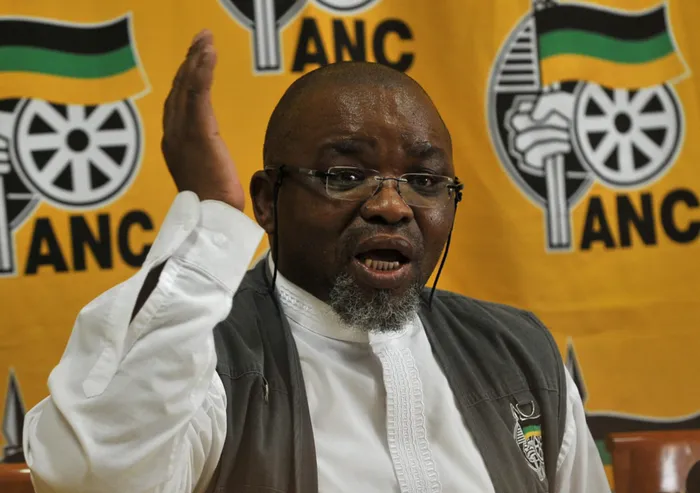‘ANC imploding’

CONCERNED: ANC secretary-general Gwede Mantashe's latest report to the national executive committee paints a disturbing picture of the party's infighting. Picture: Masi Losi CONCERNED: ANC secretary-general Gwede Mantashe's latest report to the national executive committee paints a disturbing picture of the party's infighting. Picture: Masi Losi
MOSHOESHOE MONARE
T HE ANC is imploding – open divisions among its senior leaders mean the party will celebrate its centenary next year more divided than it was in 2007.
This is ANC secretary-general Gwede Mantashe’s frank appraisal – contained in his organisational report to the party’s national executive committee (NEC) last weekend.
Mantashe told The Star yesterday the report was a regular assessment as required by the party’s constitution. He paints a disturbing picture of infighting, NEC members failing to do their work and sowing divisions.
Just more than a quarter of the party’s members are not in good standing and its demographic profile reveals a party failing to achieve its non-racial goals.
Mantashe said divisions in the NEC – the second-highest decision-making body – “are becoming more glaring, with comrades locked into groupings. “More worrying is the efforts comrades put into dividing the organisation. Comrades invest a lot of time and energy in trying to divide the (top six) officials and then shout that even the officials are divided.
“Some comrades work for the chaos because chaos and anarchy are good forests for mischief… When there are tensions in the regions and branches, it is confidently claimed that they are victimised because they support one group or the other.
“Provinces complain of NEC members who visit their provinces (at) night to promote divisive factional interests,” said Mantashe.
He warned the organisation that unless the NEC took a firm position, “the 53rd national conference (next year in Mangaung) looks set to be more polarised than the 52nd (conference in 2007 in Polokwane)”.
In 2007, the party was fiercely divided as one faction supporting Jacob Zuma fought successfully to remove Thabo Mbeki as party head. Mantashe said insults hurled at Zuma by his own colleagues were worrying.
“Comrades boldly boast that the abnormal situation and the divisions that characterised the 52nd conference must now be accepted as a tradition of the ANC.
“Kingmakers and bookmakers can only survive when the NEC is divided. Politics of blackmail get stronger when factions are growing stronger than the organisational structures,” he said. Mantashe also warned the ANC Youth League’s “confrontational and aggressive posture against the ANC”.
“(This posture) can only systematically dent the image of the ANC in the eyes of the society.”
He said the league’s personal attacks showed “narrow shortsightedness”. The league, under Julius Malema, wants Mantashe to be replaced by the former’s predecessor, Fikile Mbalula, next year.
He had harsh words for NEC members who failed to attend meetings. “It is clear that only a fraction of the NEC takes their deployment to the provinces seriously,” he said.
He said NEC members also failed to attend alliance summits and meetings of ANC subcommittees, which dealt with issues that were mostly developed into policy proposals for government.
“The subcommittees depend on non-NEC members to do their work. In (the) majority of cases, chairpersons of subcommittees only convene meetings when there is pressure to deliver a report or when there is a specific policy issue at hand that affects the committee concerned”.
Although the ANC had increased its membership by 50 percent to 933 672, not all members seemed credible. Of the 4 316 branches, only 1 286 “were in good standing during the last audit”.
“This is pointing to the general problem of provinces only taking the need for branches to be in good standing when there are conferences rather than ensuring that this is how the organisation should be,” said Mantashe.
He said suspicions of member manipulation were justified because there was unfair gate-keeping in some provinces and bulk-buying of membership for factional reasons. “If we don’t confront these problems, our membership will be seen as fake.”
The majority of new members were “ignorant of the values, traditions and culture of the organisation”.
“Some join the ANC so that they can have the credentials in business deals. Such members have no interest in the well-being of the organisation beyond their narrow material interests,” he said.
Mantashe said the party was slow in recruiting members of other races. “The fact that the membership of the ANC is predominately African… is indicative of the slow progress we are making in building a nonracial society.”
The party is not only confronted by race issues, but ageism. “The membership is visibly growing younger and is perceived to be intolerant of the older members,” warned Mantashe.